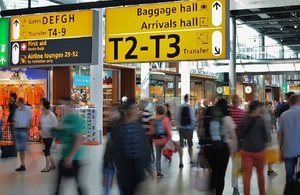Report 09/2022: Collision between road-rail vehicles near Ramsden Bellhouse
Summary
On 2 May 2021, just before 07:00 hrs, two road-rail vehicles (RRVs) collided while travelling on the same track towards Wickford station from a location of work near Ramsden Bellhouse, Essex. The leading vehicle, a mobile elevating work platform (MEWP), was stationary at the time of the collision and was hit from behind at around 7.5 mph (12 km/h) by a road-rail machine, configured as a crane. The MEWP operator suffered life-changing injuries due to the collision.
Around 10 seconds before the collision, the MEWP operator had stopped to stow away a tool which was loose in the personnel basket of his machine. Around the same time, the operator of the crane became dazzled by the rising sun ahead. The crane operator turned to look out of the side window to relieve his eyes but did not apply the brakes of the crane when he did so, resulting in the collision with the MEWP.
Before the collision, the crane operator had allowed the gap between the crane and the MEWP to reduce so that, when the MEWP stopped, it was only about 30 metres. Network Rail standards require operators to maintain a minimum separation distance of 100 metres when travelling in convoy with other vehicles. The shortened separation distance in this case reduced the time that the crane operator had to observe and react to the obstruction ahead.
Fatigue was a possible factor in this accident, as the crane operator had not taken advantage of the opportunity to rest before the nightshift at a hotel provided by his employers. He had also not declared his actual travel time when providing his journey details at the site access control point.
A possible underlying factor was the lack of clarity in the role of machine controllers during travelling movements. This may have contributed to a lack of warning of the impending collision from the crane controller, who was riding in the cab with the crane operator.
A similar collision occurred at Wellingborough on 15 August 2019. The industry’s investigation into that accident found that the machine operators involved had been regularly ignoring the need to maintain an adequate separation between vehicles. Although action was taken to modify behaviours, site inspection procedures were not revised to assure compliance and RAIB found that the plan for the work being undertaken on 1 to 2 May 2021 did not explicitly cover the need for suitable distances to be maintained. Not applying learning from this previous accident is also a possible underlying factor.
Recommendations
RAIB has made three recommendations. Two of these are addressed to Network Rail and include the need to clarify the role of a machine controller when they are travelling with their vehicle, as well as the need to continue the development of obstacle detection for road-rail vehicles. A third recommendation is made to SPL Powerlines UK and Readypower Rail Services relating to the application of learning from previous accidents and incidents.
RAIB has also identified four learning points. These alert operators to the need for bringing vehicles to a stand when forward vision is lost, and the importance of judging and observing the correct safe distance between moving vehicles. It is also important that staff are fit and appropriately prepared when reporting for duty and comply with all road-rail vehicle operating instructions.
Andrew Hall, Chief Inspector of Rail Accidents said:
Sadly, this readily-avoided accident led to a member of railway staff sustaining life changing injuries.
Bright sunlight can temporarily dazzle or obscure vision. It is important that those driving vehicles by line of sight, slow sufficiently or stop if visibility becomes poor. Even momentary dazzling can lead to an unsafe situation rapidly developing.
When operating rail-road machines on the railway it is essential to maintain the defined safe distance of 100 metres with other moving vehicles. This accident involved differential speeds dangerously reducing the distance between the vehicles from 90 metres to approximately 30 metres during the journey. Recognising the true distances involved, as well as the potential consequence of road-rail vehicles travelling in convoy at different speeds, is vital to maintaining safe distances between vehicles.
What is particularly frustrating about this accident, is that lessons from a previous accident involving the same contractor had not been learned. Both accidents shared similar factors including a lack of adequate separation between vehicles, a loss of attention and avoiding action not being taken. Not applying these lessons to improve planning of work or the site assurance processes was an opportunity missed to avoid a collision with severe consequences.
Notes to editors
-
The sole purpose of RAIB investigations is to prevent future accidents and incidents and improve railway safety. RAIB does not establish blame, liability or carry out prosecutions.
-
RAIB operates, as far as possible, in an open and transparent manner. While our investigations are completely independent of the railway industry, we do maintain close liaison with railway companies and if we discover matters that may affect the safety of the railway, we make sure that information about them is circulated to the right people as soon as possible, and certainly long before publication of our final report.
-
For media enquiries, please call 01932 440015.


